FILM REVIEWS:
ALL WE IMAGINE AS LIGHT (India/France/Lux/Neth 2024) ***½
Directed by Payal Kapadia
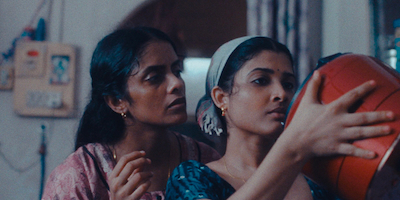
A female film all the way directed by also by a female, The hit at this year’s Cannes is a hazily lit, dreamy and idyllic-looking feature bringing together three women, each of whom have their own problems. Prabha (Kani Kusruti) and Anu (Divya Prabha) are roommates and nurses at a Mumbai hospital. Prabha is married, but her husband went abroad to work many years ago. Now drifting into middle age, she focuses on her job. Anu, by contrast, is young and full of dreams for her future, which she hopes will include the handsome Muslim boy she’s secretly seeing. Prabha initially regards the potentially scandalous affair as an annoyance, but she comes to sympathize with Anu’s passion, perhaps because she, too, feels the tug of frustrated ardour, thanks to the attentions of a poetry-writing doctor. When Prabha’s friend Parvaty (Chhaya Kadam) is evicted from her home by heartless developers, she decides to return to the coastal village of her youth. Prabha and Anu tag along for a holiday. Far from the city’s perpetual clamour, the women’s feelings and sense of life’s possibilities are given free rein. The film celebrates womanhood, showing how each needs to support another in the face of male-related problems. In unity, females can face the world with strength and resilience—great shots of Dubai life and the beautiful Indian beach areas.
THE GIRL WITH THE NEEDLE (Pigen med nålen)(Denmark/Sweden/Poland 2024) ****
Directed by Magnus von Horn

Premiering at Cannes this year followed by screenings at the Toronto International Film Festival, THE GIRL WITH THE NEEDLE is an excellent historical drama though a very depressing one. The film is shot in black and white with a setting in post-WWII Denmark, which is made even more depressing by the story in which bleakness piles upon bleakness. If one can stomach the bleakness, a superbly crafted film is in for the taking, though definitely not of a feel-good nature. The film is based on true life events - that of a baby killer, one of Denmark’s most infamous killers. A woman pretends to take in babies from mothers who seek a better life for their babies, but the woman kills babies instead using several methods.
The protagonist is Karoline, a young woman trying to survive after the war. Vic Carmen Sonne is remarkable in her portrayal of Karoline, a young seamstress trying to survive on her own since her husband was declared missing in action. Fortune smiles upon her when she develops a connection with Jørgen (Joachim Fjelstrup), the owner of the factory where she works. Yet a cascade of misfortunes soon reminds her of how little protection she enjoys. As the film progresses, one can only pity Katroline as things get from worse to worse.. Can things improve even a little? Firstly when the film begins, Karoline is evicted from her squalor apartment. She finds lodging in an even more horrid room with no running water and a window that cannot be opened. She is warned not to have any visitors though one can only imagine who would want to visit such a place.
Her woes improve a bit as the events set her on the path toward Dagmar (Trine Dyrholm), a shop owner she works for as a seamstress, who offers a particular service to women in need. The dynamic they form will have major repercussions for them both. They fall in love and she is impregnated by him. Just as one can think the film is leading towards the kindness of human beings, Dagmar’s mother stops the romance between her son and her and tosses her out on the street. She takes a needle to a public bath and tries to abort the unborn child, hence the title of the film THE GIRL WITH THE NEEDLE. There she meets the baby killer and things do NOT get any better. Karolyn and the baby killer strike up a camaraderie, even when Karolyn discovers the truth. More of the darkness is included with the reappearance of Karolyn’s supposedly husband missing in war with a disfigured face. Why he has not responded to her letters is not really explained in the film. The ugliness of his facial injury is not hidden from the audience.
For all its bleakness and depression, THE GIRL WITH THE NEEDLE is a compelling film with strong performances, stunning cinematography, and production values. I ranked it one of my Top 10 films of 2024.
THE GIRL WITH THE NEEDLE, the Danish entry for Best International Feature for the upcoming Academy Awards opens in theatres on Nov 27th, 2024.
Trailer:
GLADIATOR 2 (USA 2024) ***
Directed by Ridley Scott

GLADIATOR 2 opens with the fall of an African city as the hero, the gladiator of the title is taken in as a slave of Rome
Sixteen years after Marcus Aurelius's death, Rome is ruled by the corrupt twin emperors Geta and Caracalla. In Numidia, Roman refugee Lucius Verus lives under the alias "Hanno". General Marcus Acacius's Roman army invade and conquer the city, enslaving Lucius and killing his wife Arishat. To advertise the slaves as potential gladiators, the Romans pit them against feral baboons. Lucius savagely kills a baboon, impressing stablemaster Macrinus. Although Lucius does not want to be a gladiator, Macrinus promises him an opportunity to kill Acacius if he wins enough fights in Rome.
Acacius is welcomed back to Rome as a war hero. Geta and Caracalla arrange gladiatorial games in the Colosseum to celebrate Acacius's victory. Disillusioned with war, Acacius requests a vacation with his wife, Lucilla, but the emperors refuse and plot to conquer Persia and India. Senator Thraex throws a party for the emperors and arranges a gladiatorial duel as entertainment. After Lucius wins, Geta asks where he is from. Lucius contemptuously recites Virgil's poetry, revealing his Roman education. Ravi, the gladiators' doctor, treats Lucius's injuries and befriends him.
GLADIATOR 2 works best when it combines camp with blood and gore. The two emperors of Rome that dictate the citizens are campy in their makeup and their mannerisms, They eventually get their comeuppance towards the end. The thing that does not work that is glaring in its flaw is the d=gladiator segment in which Lucious fights the feel baboons, large creatures that look like aliens from outer space rather than ferocious animals. The film takes an unrealistic sci-fi ALIENS look instead of being grounded in historical authenticity,
Paul Mescal replaces Russel Crowe as the action hero gladiator. Mescal performs well and has been seen in almost everything these days ever since he became famous after being in AFTERLIFE. Of the cast, Academy Award Winner Denzel Washington stands out as a rare gay role for the actor while also playing a villain. Matt Lucas from Little Britain plays the Master of Ceremonies. Sir Derek Jacobi as Senator Gracchus: A member of the Roman Senate who opposes the growing corruption of the Imperial Court. Jacobi reprises his role from the original film.
It took a while before this sequel went to the screens. GLADIATOR 2 is a gore-violent blood fest with lots of action set pieces in which heads and upper torso are dismembered. Story-wise, the film is a disappointment with a predictable plot and cliched characters. At a running time of 2 hours and 20 minutes, the film moves fast, but not without flaws including a few out-of-step sequences.
GLADIATOR 2 and WICKED both open this week on November 22. The new nickname coming into play is the word GLICKED. Which film will be victorious at the box office? Good marketing targets two highly different film genre groups.
Trailer:
GT MAX (France/Belgium 2024) ***
Directed by Olivier Scneider

GT Max in the film is a band of motorbikes of quality below Yamaha. In reality, it is a well-known motorbike accessories company established in the state of Selangor, West Malaysia. Following the trend of high-speed vehicle heist movies that were popular in the60s and 70s like Peter Collinson’s THE ITALIAN JOB with Michael Cain e and Henry Verneuil’s THE BURGLARS with Jean-Paul Belmondo and more recently in French films like TAXI and even more recent in THE FAST AND THE FURIOUS, GT MAX is another addition to the genre. There is nothing really excitingly new in terms of plot, in fact, the storytelling is predictable though well stretched out with many characters, the film is a solid fast time waster that should appeal to both dirt motorbike speed fans as well to new converts. The film is fast and furious and the chase scenes, particularly around Paris, with immediately recognizable street and walkaways by the Seine is what makes the movie especially engaging.
Soélie, a young motocross prodigy, sees her dreams of success shattered by an accident. The reason for the accident is not explained till the middle of the film. Not that one cannot guess the reason, but despite her stating that even riding un vello would also give her the jitters, she is suddenly riding a motorbike at top speed as if nothing had happened and she is perfectly normal for no reason. Till then, she had devoted herself to training her brother, Michael. When he is recruited by TMAX scooter racers for a high-profile heist in Paris, Soélie must overcome her fears to save him. To make the story more intriguing, more characters are drawn to the story like an over-obsessive cop, Lucas who is intent on catching the motorbike gang in their next caper. The mastermind behind the heist is Elyas, who has no claims of killing off any in the way. Of course, there needs to be a little romance. Soelie and Theo get a romance going, Solely and Michael’s father also come into the story, with his company going for broke, doing 150 thousand euros. The kids have to do the heist to make ends meet. All the story details are cliched, but the exciting bike chases that ensue is the reason MTMAX rises above the average action movie.
The relatively unknown cast delivers credible performances despite the predictable story and cliched characters.
GT MAX is director Olivier Schneider’s directorial debut. Schneider began his career as a stuntman on more than a hundred films before becoming a fight choreographer and Stunt Coordinator. In 2007 he signed the fights of the film TAKEN with Liam Neeson in the lead role. There is a climactic fight between Elyas and Lucas at the film’s climax.
GT MAX is an original Netflix French action movie, and is open for streaming g on Netflix this week. Totally watchable movie with time flying as fast as the speed of the motorbikes.
Trailer:
JOY (UK 2024) ***1/2
Directed by Ben Taylor
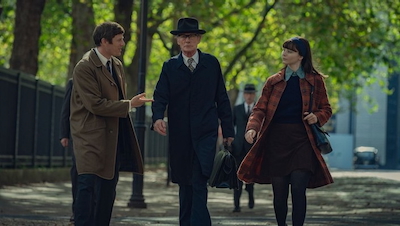
JOY (not to be confused with the David O. Russell Jennifer Lawrence film, is about 3 trailblazers: a young nurse, a visionary scientist, and an innovative surgeon who face opposition from the church, state, media, and medical establishment in their pursuit of the world's first 'test tube baby,' Louise Joy Brown. IVF. On 10 November 1977, Lesley Brown underwent a procedure, later known as in vitro fertilization (IVF), developed by Patrick Steptoe, Robert Edwards, and Jean Purdy. Purdy was the first to see Brown's embryonic cells dividing. The process is called IVF. Natural Cycle in Vitro Fertilization (IVF) is an assisted reproductive technique designed to mimic a woman's natural menstrual cycle closely. In traditional IVF, a woman's ovaries are stimulated with fertility medications to produce multiple eggs, which are then retrieved and fertilized outside the body. On the other hand, a natural cycle IVF works with the woman's natural hormonal fluctuations and ovulation cycle. Edwards, as the only surviving partner, was awarded the 2010 Nobel Prize in Medicine for this work. In March 2022, a plaque was installed at Royal Oldham Hospital to record the importance of Sister Muriel Harris and Jean Purdy to the work.
Dr. Edwards is portrayed by award-winning British actor Bill Nighy, who rose to fame after his role in LOVE ACTUALLY. Nighy brings dignity to the role of the doctor who had to fight to make his discoveries heard.
The film is a touching story of medical history that is given a human touch making it emotional and moving. The film is told from the point of view of Jean Purdy, marvelously portrayed by New Zealand actress, Thomasin McKenzie. The film’s most moving part is Nighy as Dr. Edwards plays the piano with his wife seated beside him. She says she was looking forward to a retirement with wine and holidays to which he retorts: “So am I. But this is something that matters, at which he continues playing the piano. Director Taylor is to be commended for the way he keeps the momentum of the film’s interest from start to finish.
Director Ben Taylor is a TV episodes (SEX EDUCATION, THE AVENGERS) director making his first feature film directorial debut in a film written by Rachel Mason, Jack Thorne,
Emma Gordon and Shaun Topp. A period piece, the budget pic contains authentic and believable production sets that convey the times and atmosphere of the story,
JOY is a touching British biopic of the test tube baby (Louise Brown) that is open for streaming on Netflix this week.
Trailer:
MARIA (Italy/Germany/Chile/United States 2024) ***
Directed by Pablo Larrain

MARIA is the third film in Larraín's trilogy of 20th-century iconic women, preceded by SPENCER (2021) and JACKIE (2017).
MARIA, the film about Maria Callas, is set during Her final years in Paris in the 1970s. It is not a Callas biopic, as neither were the two other Lorain films, JACKIE and SPENCER, about Jacqueline Kennedy and Lady Diana Spencer.
Angelina Jolie portrays the diva, the diva that she is. She is proud and pompous like a peacock who does not care for anyone else except for the wealthy and famous in her social circle. Vanity project or Oscar bait? Could very well be both. It is noted that Bradley Cooper’s MAESTRO on Leonard Bernstein did not win him an Academy Award nomination for Best Actor. But to give credit where credit is due, it should be noted that to prepare for her role, Jolie spent seven months training to sing opera. In the scenes set during Callas' heyday, an estimated 90 to 95 percent of Callas' original recordings were used, with Jolie lip-synching along to these songs. However, Jolie's singing comes to the fore during the film's final act. It is reported that the film received an eight-minute standing ovation at the Sala Grande Theatre during its world premiere, reducing Angelina Jolie to tears.
When the film opens, Callas is suffering from ill health, often taking too much medication. She has lost her ability to sing and perform, but her reputation still precedes her. One would wish more information be given on how she lost her goal abilities. Still, she is headstrong aided by no less, her personal butler and housekeeper. She often asks her housekeep how she sing, noting that the housekeeper has no operatic experience. Yet she trusts her judgment. Her two employees obey her at her every request, and the butler supports her and beats up a reporter who is hounding her and threatening her that her audience no longer respects her. The reporter is pushed severely by the by=tler, and he clerkly deserves what he got.
The film celebrates an Italian cast, though Callas was an American-born Greek soprano. Angelina Papadopoulou plays young Maria Callas, while Pierfrancesco Favino as Ferruccio and Alba Rohrwacher as Bruna plays the Callas’s Italian household.
Callas loves her pets dogs - two of them, often seen following her around her residence. “It is 99% about food and 1% about love,” she remarks, which is very true for all dogs.
The best thing about the film is the images of the real Maria Callas, which include her aging during the closing credits. The audience gets to see the real person in her glamour with it fading during her latter years.
MARIA is pretty much the same as Larrain’s other two films of his trilogy JACKIE and SPENCER, with elaborate and meticulously orchestrated production set pieces but empty vehicles on the whole where the sum of the parts do not really add up to a strong narrative or purpose.
Despite the chaotic often unrelated segments and often glorified scenes of Callas, the film is still magnificent to look at, and does Callas justice that is due to her.
MARIA opens in select theatres on November 27th and streams on MUBI from December 11, 2024.
Trailer:
MAYBE BABY 2 (Bytte Bytte Barn)(Denmark 2024) **
En film af Barbara Topsøe-Rothenborg
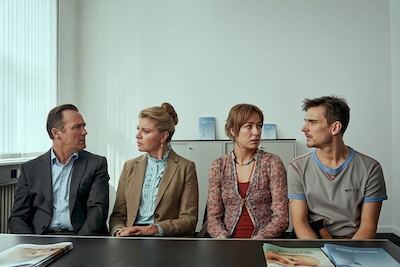
We meet the two couples again: Cecilie and Andreas, and their son Leo, and Liv and Malte, and their daughter Sille. The first MAYBE BABY (not to be confused with the British comedy about a couple trying to have a baby) is nothing much to write home about and this sequel is a tedious and unfunny monotonous attempt at trying to be smart and funny,
Both children are now 2 years old, and the families still keep in touch but live very different lives. During a medical examination, it is revealed that the two babies were never swapped. After the shock subsides, the two families decide to move in together in a collective at Andreas and Cecilie's place, so both sets of parents can be with both children every day. There is some attempt at humour aimed at the subject of commune living, again nothing that would register a laugh mark on the laughter scale, However, soon the couples' very different views on lifestyle, decor, eating habits, and parenting methods become apparent, and the two families struggle to live under the same roof. There is not much insight or keen observations on this subject either. Cecilie feels much more attached to her biological daughter Sille than to Leo, and she decides to pursue custody of Sille behind the backs of the other three parents. This twist in the storyline that begins roughly the halfway mark attempts to up the story up a notch. Cecilie realizes she has acted wrongly, but it is too late, and her selfish project is exposed. The collective falls apart, (surprise, surprise!) Liv and Malte move away with Sille, and Cecilie must fight to be forgiven and find a solution everyone can live with.
The film tackles a few motherly issues such as balancing work and bringing up a baby and how to rear a child that is either too active or a bit too smart for its age. The film gets a bit sentimental at the end and it is clear the filmmakers are trying a bit too hard to make the family comedy work,
Maybe BABY 2 is an original Danish Netflix film that is open for streaming this week on Netflix.
Trailer:
NEVER LOOK AWAY (USA 2024) ***½
Directed by Lucy Lawless

The doc NEVER LOOK AWAY celebrates Margaret Moth, warts and all.
Born in Gisborne, New Zealand, as Margaret Wilson, she got her first camera at age 8.
She was the first news camerawoman in New Zealand, originally for the local DNTV2 station in the South Island before working for the national TVNZ channel. She changed her name to Margaret Gipsy Moth reportedly because of her love for parachuting from Tiger Moth airplanes and her desire to have her "own" name.
The doc initiates the audience to the woman with her first fling with a 17-year-old while she was 30. The doc then follows Moth as she moved to the United States and worked for KHOU in Houston, Texas, for about seven years before moving to CNN in 1990. Moth covered the Persian Gulf War, the rioting that followed Indira Gandhi's assassination, the civil war in Tbilisi, Georgia, and the Bosnian War. She had been described by colleagues as quirky, tough, fearless, and funny.
The doc works avoids being a biopic by omitting Margaret’s past. When the first boyfriend (the17 17-year-old), Jeff Russi asks Margaret about her past, her reply is that she had forgotten. So, no mention of her childhood is found in the doc.
Risks come with a price. No one is invincible - Margaret Moth included, In July 1992, Moth was shot and severely wounded while filming in Sniper Alley in Sarajevo. Because of this injury, considerable damage was done to her body, and her speech became slurred. Despite her injuries, she returned to work in Sarajevo six months later, joking that she was going back to look for her missing teeth.
War is the ultimate drug. Better than rugs like LCD and heroin that CNN photojournalist Margaret Moth partakes. CNN camerawoman Margaret Moth made the wars in Bosnia and Herzegovina and Lebanon, and Operation Desert Storm in Iraq, real for North American television audiences. While her fellow journalists took cover, Moth ran towards danger, camera in hand, to get the shots. Colleagues including Christiane Amanpour attest to her bravery but it is Moth’s friends and lovers who reveal the self-destructive nature of the artist behind the lens. Innovative reconstructions of her near-lethal assignment in Sarajevo’s Sniper Alley, which turned Moth into headline news, are paired with unsettling interviews with witnesses to her daredevilry, forming the grit of this unconventional portrait. In her directorial debut, actor Lucy Lawless reveals the fearlessness of a fellow Kiwi woman The document ends with Moth being diagnosed with colon cancer and dying in the arms of an old friend fellow CNN cameraman
at the age of 59. The film’s ending minutes are spent concluding on the courage of the woman and the large impact her journalism had on stopping wars.
Director Lawless also goes personal, trying to understand the woman who faces danger and dismisses family life. What is behind her anger? Why is her background leading to this state?
If the name of the director Lucy Lawless sounds foamier, she is a famous New Zealand actress. She is best known for her roles as Xena in the television series Xena: Warrior Princess, as D'Anna Biers in the re-imagined Battlestar Galactica series, and as Lucretia in the television series Spartacus: Blood and Sand and associated series. Since 2019, she has starred as Alexa in the television series My Life Is Murder. NEVER LOOK BACK is her directorial debut.
Trailer:
THE SHADE (USA 2023) ***
Directed by Tyler Chipman
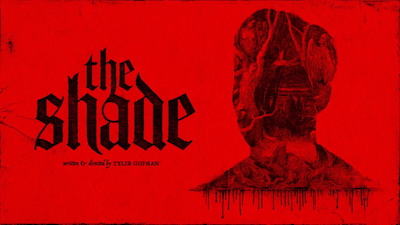
THE SHADE begins with a car driving into a graveyard. A man and his son exit the car to enter the graveyard. The man begins to set fire to a tombstone. The boy witnesses the grave being set afire together with his father burnt to death. an indeed traumatic experience for the boy. The film time cuts to the future where the boy, Ryan now a teen of 20, wakes up from the nightmare, suffering mental trauma and taking medication for it while seeing a therapist routinely.
A grieving young man struggles to protect his family from an unspeakable darkness.
Ryan Beckman (Chris Galust), a 20-year-old college student from a declining town in the northeast, struggles with a debilitating anxiety disorder following his father's death. His older brother, Jason, returns home unexpectedly while battling his own demons. Together with his younger brother James, Ryan struggles to break the destructive cycle threatening their family as ancient darkness closes in on them.
THE SHADE, directed by Tyler Chipman and co-written by the director and David Purdy covers several genres and can best be described as a drama, thriller, psychological thriller, and horror. It runs a lengthy 2 hours, a bit long for a typical 90-minute horror feature, but the extra time allows the film both character and plot development. The excellent blend of psychological horror and family relationship drama makes THE SHADE stand out as a compelling film.
The film spends its first hour introducing the family unit, with its problems and Ryan’s troubled relationship with his mother and his returning older brother Jason. One night, he enters his brother’s room to confront him with the extra loud music blaring only to vaguely see a woman there before Jason punches on him. More agony to the family arises when Jason is found dead in’s room. Ryan tries to protect the youngest brother who seems to cope quite well. At the same time, pressure mounts because of Ryan’s horrid low-paying pizza job. His buddies include a motor-mouthed Latino, who provides some comic relief to an otherwise serious future and his girlfriend who seems supportive until Ryan becomes a bit too much to handle, explaining her disappearance from the story for a while.
The film rests on young actor Chris Galust who does a solid job as the troubled 20-year-old. Tony Award winner Laura Benanti also deserves mentioned as Ryan’s troubled mother, who is at a loss for how to deal with her three sons. Also of notice is the cinematography which is also excellent right from the beginning of the burning graveyard scene. A lot of scenes take place in the night, allowing the d.p. to show off the talent.
THE SHADE is an impressive directorial debut that has won multiple accolades during film festivals. Among the noted ones are:
WINNER Best Special Effects – Days of the Dead Film Festival
WINNER Best Directing – Days of the Dead Film Festival
WINNER Best First Time Filmmaker – Days of the Dead Film Festival
WINNER Jury Award Best Feature Film – Snowdance Independent Film Festival
THE SHADE is available Video On Demand on November 22nd.
Trailer:
WICKED (entitled onscreen as WICKED PART 1) (USA 2024) ***½
Directed by John M. Chu
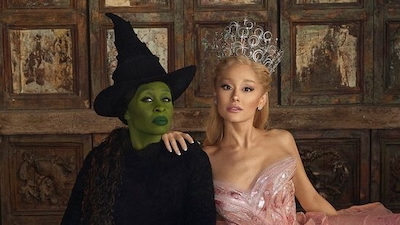
Wicked is one of the most successful Broadway musicals and the film adaptation was originally set for as way back as 2021. Unforeseen circumstances like scheduling and the Pandemic resulted in delays and even a director change from Stephen Daldry (BILLY ELLIOT), but the end result is worth the wait. Musical and theatre fans are in for a real treat with musical numbers combined with special effects, animation and romance.
WICKED is a 2024 American epic musical fantasy film directed by Jon M. Chu from a screenplay by Winnie Holzman and Dana Fox. It is the first of a two-part film adaptation of the stage musical of the same name by Stephen Schwartz and Holzman, which in turn was loosely based on the 1995 novel of the same name by Gregory Maguire. The film stars Cynthia Erivo and Ariana Grande, with Brit actor Jonathan Bailey as Prince Charming, Ethan Slater, Bowen Yang, Marissa Bode, Peter Dinklage (voicing the donkey professor), Michelle Yeoh, (as Madame Morrible and Jeff Goldblum (as the Wizard of Oz) in supporting roles. The eclectic cast gives the film political correctness with an African American Erivo, an Asdia Yang, a Malaysian Chinese Yeoh and even a Brit who plays Prince Charming. The film is also too obvious in its message on minorities. Here, the animals are the minorities that are caged and eventually lose their ability to speak. There is also an invaliding wheelchair who is portrayed by an actress in the same boat.
WICKED is directed by Chinese American John M. Chu. The films that he has directed often include musical elements, including the dance films STEP UP 2: THE STREETS (2008) and STEP UP 3D (2010), musicals JEM AND THE HOLOGRAMS (2015) and IINTHE HEIGHTS (2021), and the live concert films Justin Bieber: Never Say Never (2011) and Justin Bieber's Believe (2013). It is as if all these films prime Chu for the big budget $145 million over-the-top musical extravaganza.
WICKED is a musical extravaganza all the way, The film is lengthy with a running time of 2 hours and 40 minutes, and this is only for part 1. The phrase ‘to be continued’ appears proudly on the screen at the end of the movie,. For Broadway, theatre and musical fans, I would give the film 4 stars and three stars for others, as the musical and choreographed numbers can be a bit too much, less overbearing. For example, the first 10 minutes of the choreography do not add anything to the film but add to its production costs.
Because of the scope of the musical and the intent of including all the songs in the musical as well as the addition of new ones, the filmmakers have decided to split WICKED into two parts. Though WICKED is just touted as WICKED, the opening credits say WICKED PART 1. Part 2 arrives next year in November and is also directed by Chu.
WICKED opens in theatres on November 22nd.
Trailer;
WITCHES (UK 2024) ***½
Directed by Elizabeth Sankey
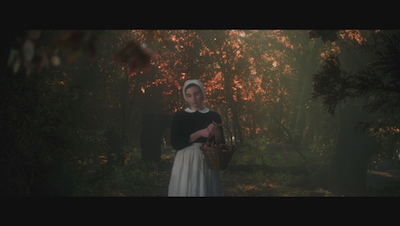
The new British documentary from MUBI that took the London International Film Festival by storm is a compulsive eerie, creepy and understandably creepy piece of work for the reason that what transpires on screen seems so real and close to home. The titles at the start of the film inform and insist that what is seen on the screen is based on true events with actual people. The woman featured in the film is the film’s director herself, sharing her own horrid experiences. WITCHES has so far received two nominations at the British Independent Film Awards 2024, for the Raindance Maverick Award and Best Feature Documentary.
The film is a profound exploration of the unexpected yet compelling connections between postpartum mental health and the history and portrayal of witches in Western society and popular culture.
Following on from her critically acclaimed feature ROMANTIC COMEDY, also released by MUBI in 2019, director Sankey now uses her trademark video essay style to turn the camera inward, focusing on her own experiences with postpartum anxiety and depression.
Using her own experience of being admitted to a psychiatric ward after the birth of her son, Sankey intertwines her personal narrative with historical and cinematic footage. It is this woven cinematic footage that creates an eeriness and makes the film so compelling. With the words spoken by the doc’s subjects, relevant footage from horror classics, the serious ones not the camp horror slasher flicks like Roman Polanski’s ROSEMARY’S BABY, George Miller’s THE WITCHES OF EASTWICK Robert Egger’s THE WITCH, Jane Campion’s ANGEL AT MY TABLE as well as oldies like Rene Clair’s I MARRIED A WITCH, all immediately recognizable because of the film’s famous faces. The film also features interviews with medical professionals, historians, and fellow sufferers, offering a multifaceted perspective on how women with mental health issues have been stigmatized and misunderstood over time while creating her own coven of women to reclaim their stories.
The doc at its most scary shows a mother and a baby isolated together. Many mothers post-birth have fears of harming their babies. Being alone with their babies is often the greatest fear these mothers may have. On the other hand, for other mothers, the bond between mother and child is healing. The doc shows that post-birth mental illness is not a rare disease and one that many have the fear of bringing out out into the open.
The scariest moments are the segments where past inmates talk about their mental anguish. One cannot recognize herself in the mirror. One has to lay out things like her spectacles and other items so that she knows how to proceed daily in life. And in the institution, they are watched daily, anoint and day by the staff who look like witches. The inmates are prisoners who are locked in with no way out.
WITCHES is arguably the scariest film of the year because it is a doc featuring interviewees who experience real horrors of potential mental psychosis and nonfiction is more real than fiction.
WITCHES had its world premiere at this year’s Tribeca Film Festival and its U.K. premiere at the London International Film Festival and is available exclusively on MUBI from November 22nd, 2024.
Trailer:




